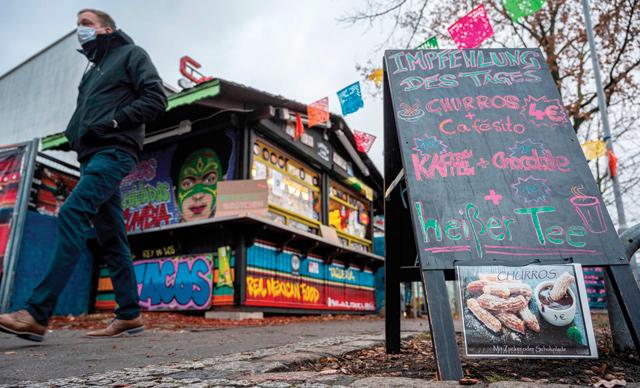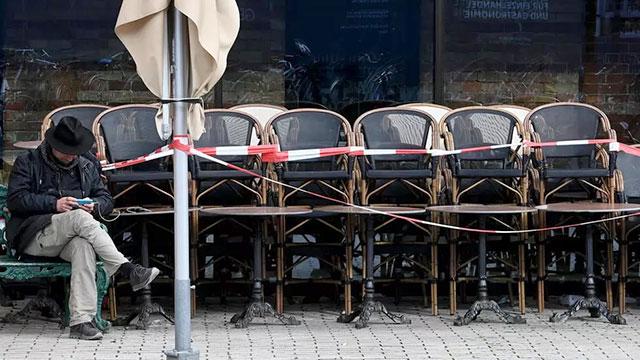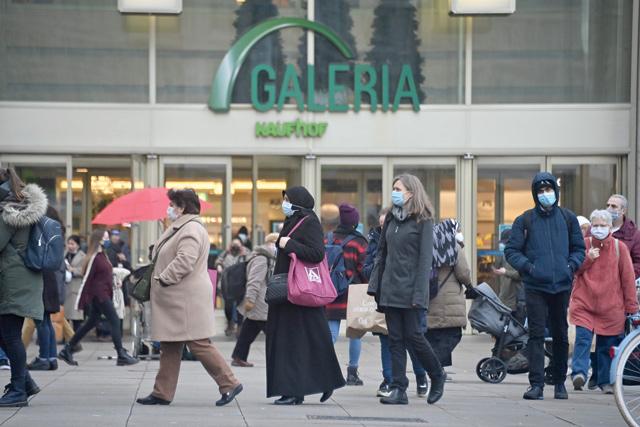You are here
Germany mulls longer shutdown as daily virus deaths top 1,000
By AFP - Dec 30,2020 - Last updated at Dec 30,2020

A menu sign outside a Kiosk offering take-away food reads: 'Impfehlung des Tages' instead of the usual 'Empfohlung des Tages' (Suggestions of the day), making a play on words with 'Impfen', which means 'to vaccinate' in German, close to one of Berlin's six vaccination centres in Treptow, eastern Berlin, amid a Coronavirus COVID-19 pandemic, on Tuesday (AFP photo)
BERLIN — Germany's daily coronavirus death toll crossed 1,000 for the first time on Wednesday, with politicians predicting an extension of the county's partial lockdown beyond the current January 10 deadline.
A total of 1,129 deaths were reported by the Robert Koch Institute (RKI) disease control centre, breaking the previous daily record of 962 logged last Wednesday.
There were 22,459 new daily infections, the RKI said.
"The infection and death figures show that we are still very far from normality," Health Minister Jens Spahn told reporters in Berlin.
"I don't see how, in this situation, we can return to how things were before the lockdown," he added.
An apparent drop in new infections and deaths in recent days was a result of local authorities not sending in their data over the Christmas period, the RKI said.
Germany is under a partial lockdown until January 10, with most shops closed along with schools, restaurants, cultural and leisure facilities.
New Year's Eve festivities will be muted, with a ban on the sale of fireworks and tight restrictions on the number of people who can gather in public.
"It will probably be the quietest New Year's Eve that Germany can remember," Spahn said.
'Nowhere near'
The health minister had on Tuesday told German broadcaster ARD that the country was "nowhere near where we need to be" and "there will undoubtedly be measures" after January 10.
Chancellor Angela Merkel and leaders of Germany's 16 federal states will meet on January 5 to decide on future measures.
Armin Laschet, the leader of Germany's most populous state of North Rhine-Westphalia, told the DPA news agency that "no one can seriously raise this hope" of restrictions ending soon.
Berlin mayor Michael Mueller also told the ZDF broadcaster he believes "we will have to continue to live with restrictions" for some time.
The eastern regions of Saxony and Thuringia remain hotspots in the country, with 330 and 255 infections per 100,000 inhabitants respectively.
More than 32,000 people have now died from the virus in Germany, which appeared to fare relatively well in the spring but has been hit hard by a second wave.
The country began its vaccination drive on Saturday, with a 101-year-old woman in a care home becoming the first person to receive the Pfizer-BioNTech jab.
Around 78,000 people have so far received a first dose of the vaccine, data released Wednesday said.
But some German regions have reported delays in receiving and administering doses.
Berlin’s health minister Dilek Kalayci said on Wednesday that the city-state would be suspending its campaign until January 11 after a planned delivery of almost 30,000 doses was cancelled.
Britain on Wednesday approved a second coronavirus vaccine developed by Oxford University and AstraZeneca, which is cheaper and easier to transport than the Pfizer-BioNTech jab.
But the European Medicines Agency is unlikely to approve it until after January, the regulator’s deputy executive director Noel Walthion told Belgian newspaper Het Nieuwsblad.
Germany’s Bild daily accused the government of having “relied too much on the European Union” in its vaccine strategy and of favouring the BioNTech-Pfizer jab over the Moderna product.
But Spahn said he believed in the “European way” and defended Germany’s approach.
“Yes, there have been bumps in the road, but the biggest vaccination campaign in history has started successfully,” he said.
According to Spahn, Germany is to receive a combined total of more than 130 million doses of the BioNTech-Pfizer and Moderna vaccines.
Related Articles
BERLIN — Doctors and public health officials pleaded with Germans on Thursday to take up AstraZeneca vaccines against the coronavirus after
BERLIN — Germany said on Tuesday it wanted the European Union to approve the BioNTech/Pfizer COVID-19 vaccine "before Christmas", as calls g
FRANKFURT AM MAIN — Europe's medicines regulator said Tuesday it would decide by December 29 whether to grant emergency approval to a COVID-



















